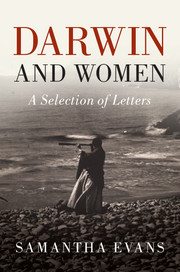Book contents
- Frontmatter
- Contents
- List of illustrations
- Foreword
- Preface
- Acknowledgments
- Symbols, abbreviations, and conventions
- 1 Friends
- 2 Marriage
- 3 Children
- 4 Scientific wives and allies
- 5 Observing plants
- 6 Companion animals
- 7 Insects and angels
- 8 Observing humans
- 9 Editors
- 10 Writers and critics
- 11 Religion
- 12 Travellers
- 13 Servants and governesses
- 14 Ascent of woman
- List of letters and provenances
- Biographical notes
- Bibliography and further reading
- Index
10 - Writers and critics
Published online by Cambridge University Press: 16 February 2017
- Frontmatter
- Contents
- List of illustrations
- Foreword
- Preface
- Acknowledgments
- Symbols, abbreviations, and conventions
- 1 Friends
- 2 Marriage
- 3 Children
- 4 Scientific wives and allies
- 5 Observing plants
- 6 Companion animals
- 7 Insects and angels
- 8 Observing humans
- 9 Editors
- 10 Writers and critics
- 11 Religion
- 12 Travellers
- 13 Servants and governesses
- 14 Ascent of woman
- List of letters and provenances
- Biographical notes
- Bibliography and further reading
- Index
Summary
Writing, like being a governess, was a respectable profession for middle-class women who needed to earn a living, and could be a satisfying means of self-expression even for those who didn't. Victorian society had an insatiable desire for novels, journalism, and science. However, feeding that desire was rarely very profitable, and women who relied on writing alone for an income often had to apply to charitable organisations like the Royal Literary Fund, or petition for a civil-list pension. Women did write under their own names, although it was also common to use pseudonyms or initials; critics could be patronising to female authors. Some of the women in this chapter were closely involved with the feminist movement; most were acutely aware of the disadvantages they were under in not having had the education they would have chosen.
Eliza Meteyard's parents had been acquainted with Darwin's parents in Shrewsbury. She never married, but earned her living from writing. The option of earning a living as a governess was not open to her, as she was deaf. She was a council member of the radical and feminist Whittington Club, and a prolific author of novels and journalism, both under her own name and under the name Silverpen. Her interest in pottery, architecture, and design was bound up with the early arts and crafts movement. Most famously, she wrote a biography of Josiah Wedgwood, the celebrated potter. Hearing that she was engaged in this work, Darwin in 1863 sent her via her publisher letters between his paternal grandfather, Erasmus Darwin, and Josiah Wedgwood, his maternal grandfather. Meteyard's letters suggest a harried existence, with little of the financial security or practical assistance that Darwin enjoyed. The heroine of her semi-autobiographical novel Struggles for fame, faced with a proposal of marriage, announces, ‘The woman who wishes to excel in literature must be alone from the cradle to the grave.’ Instead, Meteyard relied on a network of friends.
In 1865, Meteyard sent Darwin a copy of the first volume of her biography of Wedgwood.
- Type
- Chapter
- Information
- Darwin and WomenA Selection of Letters, pp. 148 - 165Publisher: Cambridge University PressPrint publication year: 2017



